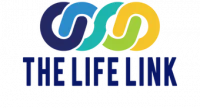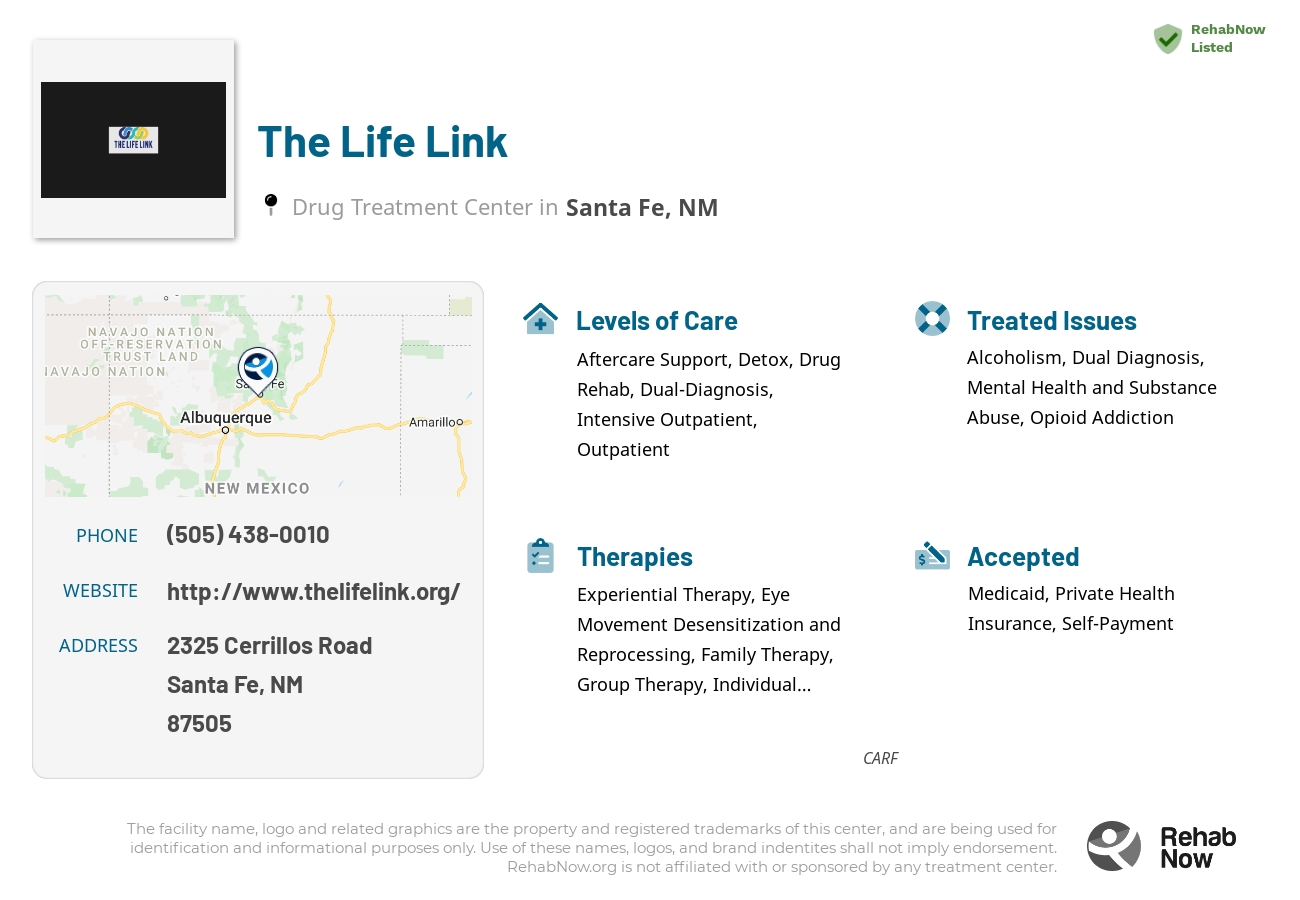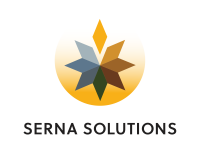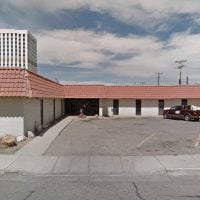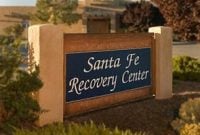About The Life Link in New Mexico
The Life Link in Santa Fe, New Mexico is a private, non-profit behavioral healthcare facility that provides a wide range of resources for addiction and substance abuse. Founded in 1991, the Life Link offers treatment and recovery services for those suffering from substance abuse and addiction. Their mission is to help individuals in recovery rebuild their lives and achieve long-term sobriety. The Life Link offers a variety of programs and services, including detoxification and medication-assisted treatment, intensive outpatient and aftercare, relapse prevention and recovery plans, family support and counseling, and peer support and group therapy.
The Life Link focuses on helping individuals in recovery gain the tools and skills needed to recover from addiction, and manage long-term sobriety. They provide customized treatment programs that address the individual's specific needs and circumstances. Their addiction treatment services include individualized therapy, 12-step meetings, and recreational therapy. The facility also offers counseling and therapy sessions, relapse prevention and recovery plans, and educational activities to help individuals in recovery build the skills needed to remain sober.
The Life Link is accredited by the Joint Commission on Accreditation of Healthcare Organizations, and is licensed by the New Mexico Behavioral Health Services Division. They have also received the Excellence in New Mexico Behavioral Health Services Award, acknowledging their commitment to providing quality substance abuse services. The Life Link is also certified by the New Mexico State Department of Health as a Level II Substance Use Disorder Treatment Provider. They are a member of the National Association of Addiction Treatment Providers, and the New Mexico Association of Addiction Professionals.
Genders
Ages
Modality
Additional
Accreditations

CARF
The Commission on Accreditation of Rehabilitation Facilities (CARF) is a non-profit organization that specifically accredits rehab organizations. Founded in 1966, CARF's, mission is to help service providers like rehab facilities maintain high standards of care.
Conditions and Issues Treated
Many people who struggle with opioid addiction need to attend specific programs like methadone , Suboxone or Vivitrol clinics.
These types of programs will provide the patient with legal, prescription medications that can help them overcome their cravings for illegal opioids like heroin or fentanyl . If the patient has a chronic condition like Hepatitis C, they must undergo treatment before they can begin taking these medications.
Dual Diagnosis is a specific relationship between two or more disorders that have the same symptoms and can sometimes be treated together. This is used in the treatment planning process when dealing with drug addicts. Dual diagnosis can be viewed as a chronic medical condition that has comorbid psychiatric disorders.
Although addiction and a mental illness may have separate symptoms that are not easy to detect, they often go hand in hand. Many times, drug abuse is a direct result of the mental illness. In other words, treating the addiction will not resolve all of your issues. Unless you also treat the underlying mental illness, you will not be successful in achieving sobriety.
Levels of Care Offered
This center offers a variety of custom treatment tailored to individual recovery. Currently available are Aftercare Support, Detox, Drug Rehab, Dual-Diagnosis, Intensive Outpatient, Outpatient, with additional therapies available as listed below.
Detox refers to the progressive elimination from the body of toxins. The detox period depends on the form of addiction, the length of drug abuse, and the state of health. Under the supervision of medical practitioners, MAT detox based in Santa Fe, NM requires the use of medications.
An intensive outpatient program is usually the first phase of addiction treatment. It provides relief for those who are addicted, but are not ready to commit to an inpatient setting. Typically, the patient lives at home and is able to work or go to school. IOPs consist of a daily 3 to 5-hour program, and there is a required number of hours per week. Most patients go to IOP between 20 and 40 hours per week. The patient attends group counseling and individual therapy throughout the duration of treatment. They also meet daily with their therapist to discuss how it’s going and where they are in the recovery process.
The goal here is to teach patients healthy coping skills, such as stress management and identifying thoughts and behaviors that lead to relapse. The implementation of these skills will be useful as the individual transitions into the next phases of treatment.
An outpatient treatment program is set up to help with alcohol or drug addiction, or a co-occurring disorder. The patient must attend the New Mexico facility for their therapy and other programs but are able to return home each night. The frequency of mandatory attendance decreases after much of The Life Link‘s program is complete.
Aftercare is a term that’s used to refer to any sort of continuing care offered for a drug addict who has voluntarily entered a rehabilitation program. This type of care can be provided in several settings, including outpatient therapy sessions after the addict has completed an inpatient program. There are also 12-step support groups, such as Alcoholics Anonymous, which can provide additional help for addicts trying to stay sober.
Therapies & Programs
Individual Therapy is a critical component of addiction recovery. Therapists work with patients to identify the root of their addiction and figure out how to better handle the issues that led to them using drugs. Individual Therapy is the one-on-one session where people meet with their therapist. Individual therapy provides a safe space for people to open up and discuss personal and sensitive topics which they may not feel comfortable discussing in a group setting.
Family therapy will also help families realize that the addiction is not their fault. For many years, people blamed themselves for an addict’s behavior and felt that they had done something wrong. This is not the case. Addiction is a disease, and it can strike anyone, even if their life seems fine from the outside. It can bring a lot of shame to a family when they have an addict in their midst, but if everyone is open and honest with each other, then they can help everyone stay in recovery.
Group Therapy is utilized by drug treatment centers like The Life Link to provide the recovering drug addict with a platform to talk about their feelings and experiences. It also provides for an opportunity to learn from other addicts who have successfully overcome their addiction.
Group Therapy is employed in lectures, seminars, or discussion groups (the latter two are typically conducted as “therapy groups”). It is recommended that all group members be recovering addicts for this type of therapy to work (though it does not exclude others with lived experience).
Trauma therapy is a clinical process that helps individuals deal with mental stress often caused by traumatic events. It is generally done for children, teenage victims of sexual assault, and war veterans. The therapist helps the person identify, understand and work through the problem. This is done with the help of talking about it in group or one-on-one counseling sessions. Therapists use relaxation, role-playing, art, and music to help the person open up about what is bothering them.
Cognitive behavioral therapy is also a popular service for individuals living with addiction. This type of supportive treatment uses both one-on-one counseling and group sessions to teach addicts how to identify thoughts, behaviors and emotions that might increase their risk of relapse.
These professionals can help addicts develop coping skills for managing stress, improving self-esteem and overcoming triggers. They might also use behavioral therapy to help addicts learn how to avoid cravings and warning signs that could lead them back into addiction.
Therapy can be used as a step-down from inpatient treatment or as the primary method of overcoming an addiction. No matter which option is best for the addict, they will teach important emotional coping techniques, which can make it easier for addicts to get through the tough days.
Eye Movement Desensitization and Reprocessing (EMDR) is a treatment that helps people recovering from drug abuse. EMDR has been proven to be more effective than traditional treatments for treating patients with addiction; it tackles the root of the problem. The rapid eye movements during EMDR sessions reduce the patient’s negative feelings related to past trauma, promoting calmness and relaxation. This, in turn, reduces the chances of relapse at a later stage.
Training in improved life skills helps those recovering from addiction feel more capable of self-care. The Life Link are daily skills that give the person the tools they need to survive.
The therapy covers practical activities like cooking, job hunting, social interaction, and money management, helping to fill in the knowledge gaps caused by addiction.
These life skills help the person self-manage their recovery and stay on track. It also reduces relapse risk as they gain confidence in their day-to-day abilities.
Patient Experience
Experiential Therapy at The Life Link
Experiential therapy is another form of treatment that helps addicts overcome their addiction. This type of service typically involves hands-on activities with the focus on physical experiences instead of emotions or beliefs.
Some examples include art therapy, equine therapy and music therapy. Each of these forms of experiential therapy can provide unique ways for addicts to channel their feelings and work through their demons. This type of therapy also allows addicts to develop meaningful emotional connections with others, which can prevent them from resorting to relapse as a coping mechanism.
Payment Options Accepted
For specific insurance or payment methods please contact us.
Is your insurance accepted?
Ask an expert, call (888) 674-0062
Additional Details
Specifics, location, and helpful extra information.
Santa Fe, New Mexico 87505 Phone Number(505) 438-0010 Meta DetailsUpdated November 25, 2023
Staff Verified
The Life Link Patient Reviews
There are no reviews yet. Be the first one to write one.
Santa Fe, New Mexico Addiction Information
New Mexico has been one of the leading states in the nation when it comes to drug and alcohol use, abuse, and addiction. Opioids are responsible for over 60% of all drug-related overdoses in New Mexico. Alcohol-related deaths in New Mexico are the highest in the nation and almost twice the national average since 2000.
In Santa Fe, NM, 7 out of every 100 people aged 12 or older were dependent on illicit drugs from 2008-to 2009. Marijuana, cocaine/crack, inhalants, and methamphetamine are some of the most common addictions. As per Drug Enforcement Administration, residents of Santa Fe even be more likely than the national average to abuse alcohol or drugs. In Santa Fe, common treatments include detox, residential rehab, and outpatient rehab.
Treatment in Nearby Cities
- Santa Teresa, NM (265.9 mi.)
- Los Alamos, NM (23.6 mi.)
- San Ysidro, NM (44.9 mi.)
- Thoreau, NM (127.4 mi.)
- Rio Rancho, NM (48.5 mi.)
Centers near The Life Link
The facility name, logo and brand are the property and registered trademarks of The Life Link, and are being used for identification and informational purposes only. Use of these names, logos and brands shall not imply endorsement. RehabNow.org is not affiliated with or sponsored by The Life Link.
